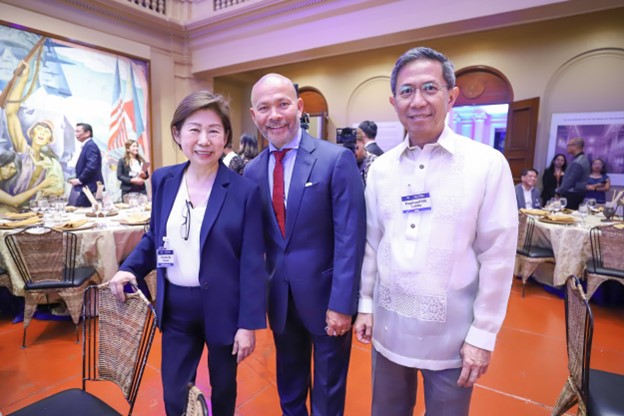While markets crashed and economies faltered across Asia in 1998, Vijay Eswaran and Joseph Bismark made what may have initially seemed a counterintuitive decision: they founded QI Group. The company defied the financial turbulence surrounding its birth to build a multinational conglomerate that now reaches across continents. Today, QI Group built an impressive portfolio encompassing education, travel and leisure, retail, wellness and lifestyle, and luxury goods.
Eswaran serves as executive chairman while Bismark holds the position of deputy chairman. Their partnership formed during a pivotal moment that Eswaran recalls vividly.
Before founding QI Group, Eswaran and his partners were working with an American direct selling company expanding into the Philippines. They successfully built a team of approximately 2,000 distributors. However, the situation deteriorated when they discovered the American company was delaying product deliveries and withholding commission payments.
“We had a choice between letting down thousands of people or taking responsibility for a team that placed their trust in us,” Eswaran recalled.
Eswaran, who had corporate management experience alongside direct selling knowledge, convinced three partners that they should start their own direct selling company. As he explained, “So, armed only with the purpose of helping those who had trusted us, we announced the decision to start our own company. That was the beginning.”
This decision marked the start of what would become a global enterprise employing more than 2,000 people across various sectors.
Where is QI Group headquarters?
QI Group is headquartered in Hong Kong and operates through a dual-hub model that includes a green-certified operational center in Malaysia’s Selangor state. This structure provided the foundation for gradual expansion into nearby South Asian markets, then the Middle East, Central Asia, and Europe, eventually reaching emerging markets across sub-Saharan Africa.
The company selected Hong Kong for its global base due to advantages including robust financial systems, strong legal protections, and strategic positioning as an entry point to key Asian markets. Meanwhile, the Malaysian hub, housed in the eco-friendly QI Tower, demonstrates the company’s environmental commitments.
QI Tower stands as proof of the company’s commitment to environmental leadership. After purchasing the 15-story structure in 2010, the company implemented comprehensive eco-friendly renovations that earned it the coveted Green Mark Gold certification from Singapore’s Building and Construction Authority in 2013. It was the first existing high-rise office building in Malaysia to achieve this distinction in the “Non-Residential Existing Building” category.
How does QI Group of companies work?
The QI Group of companies works by weaving together several operational models, combining online commerce, direct-to-consumer sales, and conventional business structures across a variety of industries. Through its investment arm, QI Capital, the group actively makes investments with various portfolio companies located in Malaysia, Sri Lanka, India, Hong Kong, New Zealand, the UK and the USA.
The company maintains a significant direct selling arm that utilizes e-commerce to distribute wellness, lifestyle, and personal care products. This aspect of the business has been a critical driver of QI Group’s growth, with millions of customers and thousands of distributors across more than 100 countries.
Quest International University (QIU), located in the state of Perak, Malaysia is one of the company’s flagship achievements in education. Since opening in 2011, QIU has welcomed approximately 15,000 students from 50 countries. The institution recently secured a $21.48 million (100 million Malaysian ringgit) Sukuk Ijarah program with a major Malaysian bank to fund the construction of a new campus and develop state-of-the-art facilities.
The luxury retail division showcases the company’s ability to operate in premium market segments, particularly through the management of prestigious Swiss watch brands, including Cimier and Bernhard H. Mayer.
Through its travel and leisure business, the company operates boutique hotels and resorts in Thailand, Malaysia, Sri Lanka, and Turkey, with a focus on eco-tourism. The Prana Resort Nandana in Koh Samui, Thailand exemplifies this commitment, having earned a gold rating from Thailand’s Green Hotel Standard for sustainability practices.
The entire enterprise operates under the philosophy of RYTHM (Raise Yourself To Help Mankind). Eswaran explained the origin in a recent interview: “Apparently, when Gandhi set up an ashram in South Africa… a young boy came to Gandhi and asked to join the movement. Gandhi apparently told him we have plenty of people to do that. What we need are specialized services. We need doctors to tend to the sick, lawyers to defend our people, teachers to educate the young minds. You need to raise yourself first, before you can help others. So, go make something of yourself first so that you are in a position to help the community. You need to raise yourself first, before you can help others.”
This philosophy has translated into corporate social responsibility efforts, including the Employee Community Impact program through which staff members have dedicated more than 120,000 hours to community service since 2013.
Building a Diverse Global Workforce
Workplace diversity is another cornerstone of the organization’s achievements. The global team encompasses individuals from roughly 50 different countries speaking over 50 languages, with employees ranging from 19 to 65 years old. The gender balance shows nearly equal representation, with women comprising 47% of the overall staff and 44% of leadership positions.
Vijay Eswaran attributed this diverse composition to deliberate strategy rather than coincidence. “When you have a large team, you have the opportunity to build diversity into the team. People with varied experiences, approaches, and perspectives who will help you cover all bases,” he said.
“If you want to create an environment that fosters creativity and innovation then you need to allow diversity of opinions. It’s not about giving up control but about making an informed decision,” he continued.
The business benefits of this approach are tangible. “McKinsey’s Delivering Through Diversity report found corporations that embrace gender diversity on their executive teams were more competitive and 21% more likely to experience above-average profitability,” Eswaran noted.
Eswaran further emphasized that “reduced employee turnover” represents a significant benefit of workplace diversity. “A great benefit of diversity in the workplace is that it improves employee morale and engagement. This factor alone can lead to higher productivity and revenue.”
Find a Home-Based Business to Start-Up >>> Hundreds of Business Listings.















































